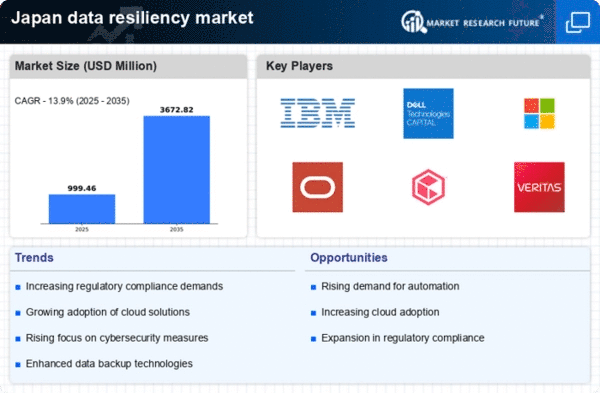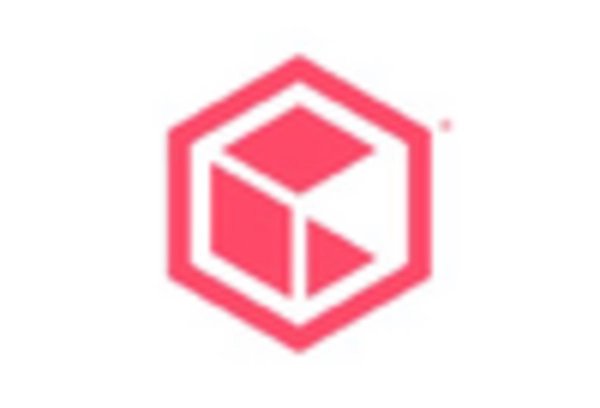Shift Towards Hybrid IT Environments
The shift towards hybrid IT environments is emerging as a key driver in the data resiliency market in Japan. Organizations are increasingly adopting a combination of on-premises and cloud-based solutions to optimize their IT infrastructure. This trend is expected to result in a market growth of around 10% in 2025, as businesses seek to enhance their data resiliency capabilities. Hybrid environments offer flexibility and scalability, allowing organizations to tailor their data management strategies to meet specific needs. As companies navigate this transition, the demand for integrated data resiliency solutions that can seamlessly operate across diverse environments is likely to rise, prompting vendors to innovate and adapt their offerings accordingly.
Rising Demand for Data Protection Solutions
The data resiliency market in Japan is experiencing a notable surge in demand for data protection solutions. As organizations increasingly recognize the critical importance of safeguarding their data assets, investments in backup and recovery systems are on the rise. In 2025, the market is projected to grow by approximately 15%, driven by the need for robust data management strategies. Companies are prioritizing solutions that ensure data integrity and availability, particularly in sectors such as finance and healthcare, where data breaches can have severe consequences. This heightened focus on data protection is reshaping the landscape of the data resiliency market, compelling vendors to innovate and offer comprehensive solutions that address the evolving needs of Japanese enterprises.
Technological Advancements in Data Management
Technological advancements are playing a pivotal role in shaping the data resiliency market in Japan. Innovations in artificial intelligence (AI) and machine learning (ML) are enhancing data recovery processes, enabling organizations to respond swiftly to data loss incidents. In 2025, it is estimated that AI-driven solutions will account for over 30% of the market share, reflecting a significant shift towards automation in data management. These technologies not only improve recovery times but also reduce operational costs, making them attractive to businesses across various sectors. As organizations seek to leverage these advancements, the data resiliency market is likely to witness increased competition among providers, each striving to offer cutting-edge solutions that meet the demands of a rapidly evolving digital landscape.
Increased Focus on Business Continuity Planning
The increased focus on business continuity planning is significantly impacting the data resiliency market in Japan. Organizations are recognizing the necessity of having robust plans in place to ensure operational continuity in the face of potential disruptions. This trend is projected to drive market growth by approximately 14% in 2025, as companies invest in data resiliency solutions that support their continuity objectives. The emphasis on proactive risk management is leading businesses to prioritize investments in technologies that facilitate rapid recovery and minimize downtime. As a result, the data resiliency market is likely to see a surge in demand for solutions that not only protect data but also enhance overall business resilience.
Growing Awareness of Data Compliance Requirements
In Japan, the growing awareness of data compliance requirements is significantly influencing the data resiliency market. With regulations such as the Act on the Protection of Personal Information (APPI) becoming more stringent, organizations are compelled to adopt data resiliency strategies that align with legal mandates. This trend is expected to drive market growth by approximately 12% in 2025, as companies invest in solutions that ensure compliance and mitigate risks associated with data breaches. The emphasis on data governance and accountability is prompting businesses to reassess their data management practices, leading to an increased demand for comprehensive data resiliency solutions that not only protect data but also facilitate compliance with evolving regulations.
















